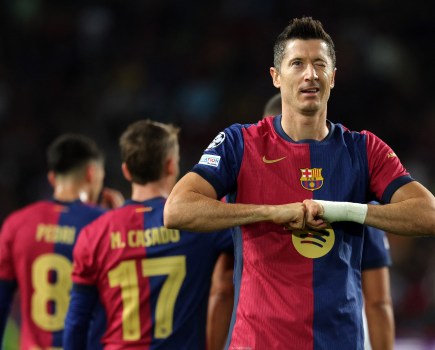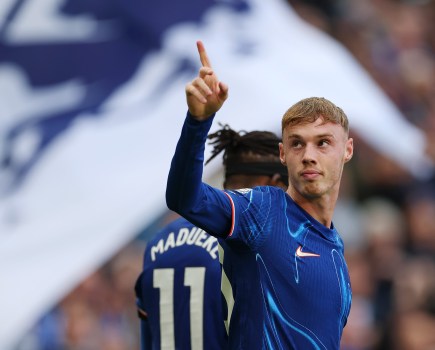 In the final game of the 1950 World Cup, an honest mistake by a man called Moacyr Barbosa condemned him to spend the rest of his life being vilified by millions. Yet did his suffering have more to do with the Uruguayan national team forging their identity around ‘garra charrua’?
In the final game of the 1950 World Cup, an honest mistake by a man called Moacyr Barbosa condemned him to spend the rest of his life being vilified by millions. Yet did his suffering have more to do with the Uruguayan national team forging their identity around ‘garra charrua’?
Taken from their nickname, ‘Los Charruas’, referring to a mysterious and long-lost indigenous Uruguayan people, the description also refers to a gritty, brave victory in the face of certain defeat. A heroic act for all eternity that the 1950 ‘Celeste’ (or Sky Blues) achieved. Appropriately, given their second-half performance in that ‘fateful final’, the term celeste also refers to a divine act. Mention 1950 to Brazilians and they reference that ‘fateful final’. (The word in Portuguese, fatidico, is indelibly associated with Brazil’s defeat).
Europe was rebuilding after WWII. The tournament was held in South America as no-one else wanted it. Only 13 countries turned up. But the Brazilians embraced it: the Maracana was built for Brazil to parade the Jules Rimet Trophy.
The tournament’s last game saw Brazil and Uruguay engaged for the right to call themselves World Champions. But many in the host country had already decided the matter. The evening before, the headline in São Paulo’s Gazeta Esportiva was: “Tomorrow we will beat Uruguay!” Rio’s O Mundo, printed a shot of the players, saying: “These are the world champions.”
Before the match began the selecao were given solid gold watches stating: ‘For the World Champions’. The carnival float that would transport the Brazilian winners around Rio was ready, as was the pre-planned victory parade. Millions of t-shirts proclaiming victory slogans had been printed. Even the Frenchman Jules Rimet – waiting to hand over his delicate golden namesake – had written his victory speech lauding Brazilian winners. Politicians predictably joined in, with Rio’s Mayor glorifying the Brazilian team: ‘in less than a few hours you will be hailed as champions…I already salute as victors’. But he neglected to mention fate, Moacyr Barbosa, and Celeste grit: crucially he underestimated ‘garra charrua’. Their determination was epitomised by the captain, Obdulio Varela, a tough, uncompromising sort who evoked the spirit of ‘garra’.
Reading the same edition of O Mundo he was so livid he bought every copy he could find. Furious at being written-off and their character questioned, he carried the papers proclaiming Brazil’s premature victory to his room, placed them across his bathroom floor and urinated all over them. It may have been an extreme example of garra. But the unyielding Varelia was also saying to all underdogs, to those dismissed or written-off: never give in.
It was a warning Brazil failed to heed.
Only one player has achieved the dream of all Brazilians – scoring in a World Cup Final for the selecao in the Maracana. A minute into the second-half Friaca realised that fantasy. It was his only goal for Brazil. It was to be the only goal Brazil scored that fatidico day. The jet-heeled right winger, Ghiggia from Montevideo, surged down the line crossing the ball for Schiaffino to equalise past Barbosa. Thirteen minutes later, Ghiggia surged down the line again. This time he was to ruin Moacyr Barbosa’s life forever.
Footage exists of 4.33pm, 16th July 1950: the worst moment of all Barbosa’s days on earth. What is a second in a lifetime of existence? For Moacyr this instant would shape the rest of his 50 years.
The moment lingers on in a melancholic afterlife on YouTube. The grainy black and white footage is shot from behind the goal to the side. Ghiggia storms in from the left – a puff of chalk fires up as he runs over the white line of the 18-yard-box – and he quickly fires the ball at a blur. The blur is Barbosa. Anticipating a cross in a sudden cloudburst of misjudgement the ball bobbles up off him at speed and disappears out of shot; the action momentarily confusing the cameraman.
What is instructive is that you can follow the Brazilian camera operative’s thought process as clearly as if you were reading his mind. His first act is to assume the ball is with Barbosa. There is a fraction of a delay in which you can feel he is confused, before the truth guides him. Senses returning, he quickly switches the camera’s view to the net. In it, he and us find the ball, nestling sadly in the far corner.
You feel the man filming simply cannot believe what has happened. The picture remains on the ball channelling his disbelief. Slowly, unhappily, he returns to Barbosa. Moacyr is on one knee. His team mates have turned their back on him. No-one consoles him. Gradually and gently, he rises. The mesmerising recording I view is in slow motion, clearly detailing and heightening their anguish.
Distraught, Barbosa looks like a man who has cost Brazil the World Cup in a dumbstruck Maracana. Barbosa is a man who has cost Brazil the World Cup in a dumbstruck Maracana.
Did those sad eyes already realise he was about to spend the rest of his life vilified by millions?
Charismatic Brazilian radio commentator Luis Mendes described the action. ‘Goool do Uruguay’, he intoned mechanically before using the same words, this time in a question. ‘Gol du Uruguay?’ He continued in a litany of different, unhappy styles, nine times in a row, from astonishment – ‘Gol du Uruguay!’- to disbelief – ‘Gol du Uruguay, and finally to acceptance – ‘Gol du Uruguay…’
The official attendance was 173,850 – some say 200,000 – making it the largest football crowd ever. Yet they all fell quiet at Barbosa’s error. As Ghiggia said years after his goal that won Uruguay a World Cup: “Only three people have silenced the Maracana…Sinatra, Pope John-Paul II and me”. It was said without any fear of contradiction.
Uruguay and garra churra won the World Cup. Modest Obdulio said: ‘it was one of those things’. The Uruguayan FA presented themselves with gold medals. After a public outcry they struck silver medals for the celeste and disbursed a little money. Obdulio Varelia had just enough to buy a 1931 Ford. A week later it was stolen.
Post-match, a preposterous Jules Rimet looked for someone to give his trophy to. ‘I finally found Obdulio. I gave it to him…without letting anyone else see’. He didn’t mention his pre-written speech praising Brazil’s victory.
Brazilians – never opting for stoicism when flamboyant exhortations suffice, variously described the defeat as ‘our Hiroshima’, ‘the greatest tragedy in Brazilian history’; ‘a Waterloo of the tropics’.
For Moacyr Barbosa, 16th July 1950 wasn’t an exercise in extravagant self-flagellation: it started a living nightmare. He was never forgiven. Life treated him harshly. He never played for Brazil again. People spat at him or abused him. He was denied coaching jobs after he retired. Having black skin didn’t help in a racially-divided country.
Once he visited the selecao to wish them well. He was denied, fearing bad luck. He was even refused a commentator’s job.
Later, Barbosa invited the few friends who had stuck by him for a BBQ. They noticed the fire in the grill’s pit – crammed with strange white logs – was raging far more than usual. The air smelt of paint burning. The week before Moacyr Barbosa had been presented with the Maracana goalposts. He could think of nothing more satisfying than to destroy them.
‘The steak I cooked that day was the best steak I ever tasted’, he recollected with a rare smile.
Yet the expected catharsis failed to materialise. After his wife died a friend revealed “he even cried on my shoulder – until the end he used to always say: ‘I’m not guilty. There were 11 of us.'”
An elderly Barbosa lamented, ‘In Brazil, the most you get for any crime is 30 years. For 50 years I’ve been paying for a crime I did not commit. Even a criminal when he has paid his debt is forgiven. But I have never been forgiven.”
In 2000, penniless and close to death, he recalled his memory of 1970 – in the year when the greatest-ever Brazil team won the World Cup, a mother pointed him out to her child in a market saying: ‘Look at him. He was the man who made all of Brazil cry’.
Heart failure caused Moacyr Barbosa to die in 2000, aged 79. Some say it was a broken heart that killed him.
By Layth Yousif
This article originally appeared in In Bed with Maradona






